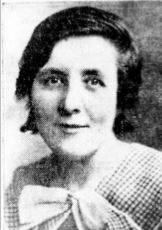Anne Loughlin
When she was 16 her father died, and Anne became the family breadwinner, starting work in a Leeds clothing factory for 3 pence an hour.
She showed a talent for journalism, and a recognition of the sorts of things that would make young women read the union paper, The Garment Worker.
She penned a series of articles in the late 1920s entitled The Woman Worker at Home, in which she instructed 'bachelor girls' on diet (tips on various ways to cook eggs), exercise and make-up.
The London organiser of the NUTGW was Sam Elsbury, founder member of the Communist Party and as combative a personality as Andrew Conley.
Apart from bitter hostility from Conley, backed by the TUC, there were growing problems with strategy and tactics within the Communist Party, which led ultimately to Elsbury's expulsion.
In particular, it was thought that the Communist Mick Mindel stood some chance (in the atmosphere of 1947) and the anti-Communist cause was represented by the long-serving (since 1905), devoutly Roman Catholic Bernard Sullivan.
This was motivated by his fear of what factionalism could to a union which had won its unity only with great effort (after a complicated amalgamation and the earlier attempt at a breakaway by the communist-led National Minority Movement).
There had been calls for something of this nature in the deliberations of the Heavy Clothing Working Party (published in 1947), upon which Loughlin had served, along with other union representatives and employers.
In late 1952, shortly after Anne had announced her retirement from the post of general secretary due to ill-health, the council was dissolved and replaced by an equally short-lived, and less effective, voluntary body.
Whether it was laying the foundation stone for a new factory, speaking at a professional association dinner or prize giving at a technical college (she believed passionately in the need for a well-skilled work-force), she would rise to the occasion.
